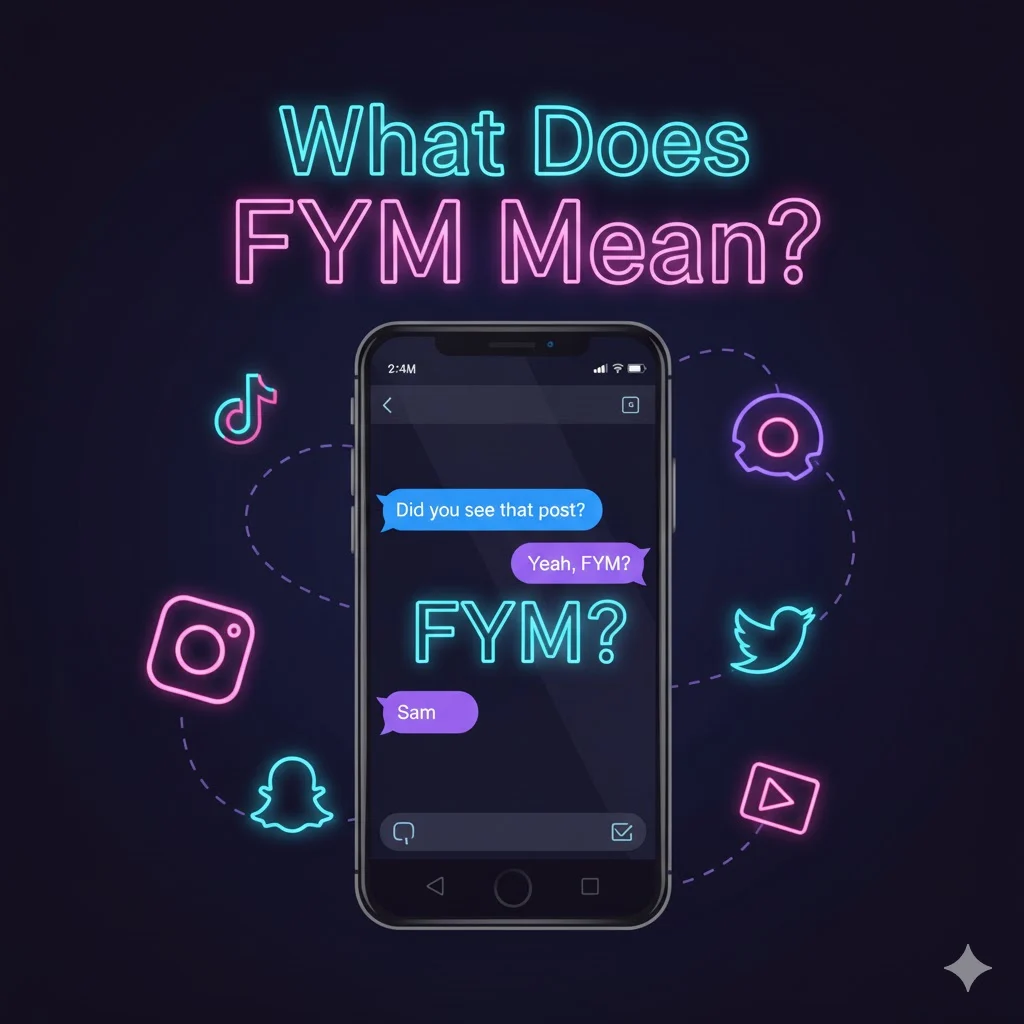Ever opened your chat and seen someone text “FYM?” and thought, what does that even mean? You’re definitely not alone.
In today’s digital world, slang and abbreviations evolve faster than ever. From Snapchat and TikTok to Discord and Instagram, short phrases like FYM appear in comments, DMs, and group chats everywhere.
Understanding internet slang isn’t just about staying trendy — it’s about communicating clearly and avoiding misunderstandings. Sometimes a small abbreviation can change the entire tone of a message. FYM is one such example — a short phrase that can sound playful, confused, or even confrontational depending on how it’s used.
In this article, we’ll explore what FYM means, where it came from, how it’s used in different contexts, and why tone matters more than the words themselves. By the end, you’ll know exactly when (and when not) to drop an FYM in your own messages.
Definition & Meaning

The slang term FYM stands for “F* You Mean”** — though many people censor it as “Forget You Mean” or simply interpret it as “What You Mean” in casual texts. It’s used to express confusion, disbelief, surprise, or challenge toward something someone just said.
In other words, FYM can mean:
- “What do you mean?”
- “Seriously?”
- “You can’t be serious right now.”
Depending on tone, it can sound funny, curious, sarcastic, or confrontational.
💬 Example Conversation
Alex: “I’m quitting the team.”
Jamie: “FYM you’re quitting? We have a tournament next week!”
Here, FYM shows shock and disagreement, not literal anger.
In another setting:
Lisa: “I hate coffee.”
Mark: “FYM you hate coffee? That’s like hating mornings!” ☕
This time, it’s playful disbelief — showing surprise but not hostility.
Key takeaway: FYM’s tone changes with intent. Among friends, it’s casual or teasing. In serious conversations, it can come off as rude or dismissive.
Background & History

FYM has its roots in African American Vernacular English (AAVE) and hip-hop culture, first gaining traction in the early 2000s. It’s a direct shortening of the phrase “What the f** you mean?”*, often used to express strong disbelief or a challenge to someone’s statement.
The abbreviation became popularized through:
- Hip-hop lyrics — artists like Lil Wayne, Future, and Chief Keef used variations in songs.
- Internet forums and memes — where users began abbreviating long expressions.
- Social platforms like Twitter and Instagram, which encouraged shorter, faster communication.
By the 2010s, FYM evolved from aggressive street slang into a mainstream internet phrase — used more casually or humorously by Gen Z and millennials.
Today, FYM appears in:
- TikTok captions (“FYM you ain’t heard this sound yet?”)
- Discord chats (“FYM you didn’t revive me!”)
- Twitter replies (“FYM that’s your ‘hot take’ 😂”)
Its flexibility and humor made it part of the global online language — much like LOL or BRUH.
Usage in Various Contexts

Let’s see how FYM changes tone based on context 👇
🗨️ In Texting
Used to express light confusion or disbelief.
Taylor: “I don’t like pizza.”
Sam: “FYM you don’t like pizza?! 🍕”
Casual, funny, and friendly.
🎮 In Gaming
Used to challenge teammates or joke around.
“FYM you missed that shot?!”
Here, it shows frustration but often in a lighthearted, team-banter tone.
💬 On Social Media
Used for reactions and memes.
“FYM it’s Monday again 😩”
or
“FYM that’s not how you spell ‘tomorrow’ 💀”
❤️ In Casual Talk
Between close friends or romantic partners, FYM can sound teasing:
“FYM you forgot my birthday?” 🎂
“FYM you don’t miss me?” 😉
In each situation, context and tone define the emotion behind the phrase.
Common Misconceptions & Clarifications
A major misconception is that FYM is always aggressive — but that’s not true. Like many slang terms, its meaning depends heavily on tone, context, and relationship.
| Myth | Reality |
|---|---|
| FYM is rude | It can be — but often it’s just casual disbelief |
| FYM means anger | Usually it means surprise or confusion |
| FYM is only for teens | It’s now used by many online users globally |
Example:
“FYM you don’t like dogs?” 🐶 → Playful
“FYM you lying?” 😠 → Confrontational
Pro Tip: If you’re unsure, use WYM (“What You Mean”) instead — it’s softer and safer in tone.
Similar Terms & Alternatives
Here are some common alternatives you might see:
| Term | Meaning | Tone | Usage |
|---|---|---|---|
| WYM | What You Mean | Neutral | Everyday text/chat |
| TFYM | The F*** You Mean | Stronger | Heated argument |
| BRUH | Are you serious? | Funny / Meme | Reactions |
| LOLWUT | What? / Confused | Silly / Internet meme | Online humor |
| WTH / WTF | What the heck / What the f*** | Mild / strong surprise | Universal |
Summary:
If you want to sound friendly or professional, stick with WYM.
If you’re joking with close friends, FYM can add humor or attitude.
How to Respond to This Term
😎 Casual Reply
“Haha, I mean exactly what I said 😜”
😂 Funny Reply
“FYM? You read that right, genius!”
💼 Professional Reply
“I just meant it in a general sense — no offense intended.”
🔒 Privacy-Safe Reply
“That’s personal, but thanks for asking.”
Different tones call for different replies — always match your response to the vibe of the chat.
Regional or Cultural Differences
While FYM is widely understood in the U.S., U.K., and Canada, its meaning can shift internationally.
🌏 Regional Insights:
- Asia: Not commonly used; “WYM” or “What u mean?” is preferred.
- Africa & Caribbean: FYM may carry a tougher, street-style tone, often used jokingly.
- Europe: Common in memes and gaming, but rare in real-life speech.
Always be aware of your audience — slang doesn’t always cross cultures cleanly.
Comparison with Similar Terms
| Expression | Short Form | Emotion | Common Use |
|---|---|---|---|
| What You Mean | WYM | Curious | Friendly chats |
| F*** You Mean | FYM | Challenging / Surprised | Texts & memes |
| The F*** You Talking About | TFYTA | Angry | Confrontational |
| Seriously? | – | Mild disbelief | Everyday speech |
Quick Summary:
- WYM = neutral
- FYM = strong / playful
- TFYTA = aggressive
Usage in Online Communities & Dating Apps
On Tinder, Snapchat, or Instagram, FYM is often flirty or teasing:
“FYM you don’t think I’m cute?” 😉
In Discord or Reddit, it’s more meme-driven:
“FYM you still playing that game?” 😂
Tip: Avoid using FYM with strangers until you know their humor style — it might sound sarcastic if they don’t get the tone.
Hidden or Offensive Meanings
Because it includes the word “F***,” FYM can easily sound offensive if used in serious or public settings.
Use “WYM” or spell out “What do you mean?” in:
- Work or school settings
- Chats with new people
- Public social media replies
Tone and audience matter more than words. What’s funny among friends may sound rude elsewhere.
Suitability for Professional Communication
In professional spaces like emails, team chats, or customer communication, FYM is never appropriate.
Use these instead:
- “Could you clarify what you mean?”
- “I just want to make sure I understand.”
- “Can you please explain that a bit more?”
These alternatives sound polite, respectful, and professional — maintaining clarity without slang.
FAQs
Q1. What does FYM mean in texting?
It means “F*** You Mean” or “What do you mean?” — used to show disbelief or confusion.
Q2. Is FYM rude?
It depends on tone. In friendly chats, it’s casual; in serious ones, it can sound offensive.
Q3. Can I use FYM at work or school?
No. It’s informal and includes profanity.
Q4. What’s the difference between FYM and WYM?
FYM is stronger and emotional; WYM is softer and neutral.
Q5. Is FYM still trending in 2025?
Yes — it’s still used heavily in memes, TikTok captions, and casual chats.
Q6. Is FYM safe to use on social media?
Yes, but only in casual or humorous contexts — avoid professional accounts.
Conclusion
Language changes faster online than anywhere else — and FYM is a great example of that evolution. What began as a bold, confrontational slang phrase has become a universal shorthand for disbelief, humor, or challenge in modern communication.
So the next time someone texts you “FYM?”, remember — they’re probably not angry. They might just be surprised, confused, or teasing you.
Use it wisely: fun with friends, never in formal spaces. Because in digital language, what you mean always matters — but how you say it matters even more




